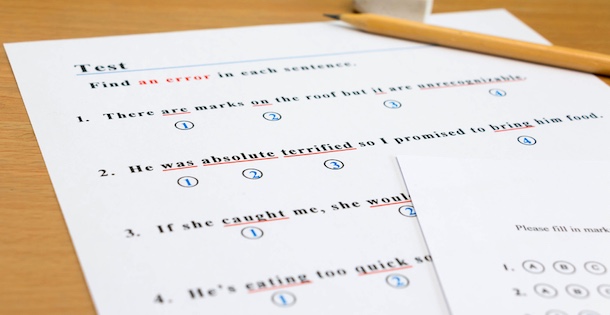How well do you know the English language? Here are three puzzlers about vocabulary and usage from the Logophile. Do you know the answers?
- Vincent needs to cleanse his palette, so he reaches for
- toothpaste
- lemon sorbet
- turpentine
- Which boy is nonplussed?
- Tom gapes at the pile of hay, unable to speak. How will he ever find the needle in there?
- Jerry smirks and reaches for the magnet in his pocket.
- What characteristic do sequoias, pneumonia, and Julia Roberts share that sycamores, influenza, and Eric Roberts do not?
Answers and Explanations
1. c. turpentine
English contains three homophones that are easily and quite often confused:
- Palate is the roof of one’s mouth or, metaphorically, one’s sense of taste. As any experienced wine taster knows, the common phrase cleanse your palate refers to act of washing away the flavor residues of what has been previously eaten or drunk to avoid tainting the flavor of the next culinary treat. However, in the question, Vincent didn’t want to cleanse his palate.
- A pallet is the small wooden platform that goods are stacked on for storage and shipping. They keep those goods above any dampness on the floor and leave a space for a forklift to get under the stack and lift it up. Pallet can also refer to a mattress stuffed with straw or a makeshift bed.
- Palette, the word used in the question, is the thin, oblong wooden board — usually with a thumbhole — that painters use to hold and mix paints while they work.
To cleanse his palette, Vincent needs to clean old paint off a piece of wood. Of the three choices, (c) turpentine will work best.
2. a. Tom
The word nonplussed is all too often misused. It was originally an English use of the Latin phrase non plus, “no more,” and meant “a state at which no more can be done or said; a state of perplexity or befuddlement.” Nonplus was also occasionally used as a verb, and perhaps this is where the surviving adjective nonplussed originated from.
Someone who is nonplussed is puzzled or shocked to the point of inaction. It has a long list of fun synonyms, including befuddled, gobsmacked, dumbfounded, and flummoxed. The answer to question 2, then, is a.
Possibly because nonplussed begins with that negating prefix non-, people sometimes mistakenly believe that it means its opposite: unfazed, nonchalant, or unperturbed.
3. They use all the five regular vowels, AEIOU, exactly once.
This happens in the English language more often than you might expect. Other common words that use each vowel exactly once are education, nefarious, questionably, subordinate, and tenacious.
Abstemiously and facetiously are especially noteworthy. Not only do they use all six vowels, AEIOUY, exactly once, but those vowels appear in alphabetical order.
These three questions first appeared in the March/April 2017 issue of the Post. Not a subscriber? You can start a new subscription here.
Become a Saturday Evening Post member and enjoy unlimited access. Subscribe now




Comments
Fun!